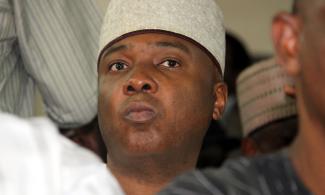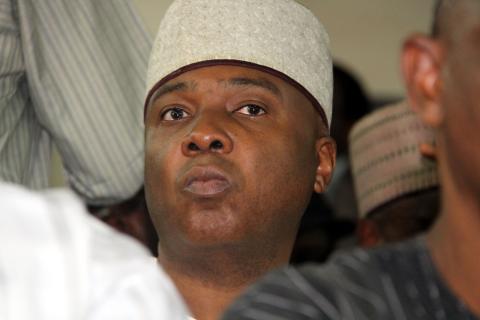
In the afternoon of Easter Sunday, one Wasiu Idris, a famous member of the Aiye Confraternity, was murdered in the Sakama area of Niger Road in Ilorin, Kwara state. The death of Idris, also known as "Wasiu Igbo-Owu" or "Adanri," was reportedly carried out by members of a rival cult gang.

Idris, who was in his early 40s, was well known in the neighborhood as a leader in his confraternity. He is also known as one of the elite thugs in the camp of Senate President Bukola Saraki.
The deceased, who was living in Saudi Arabia, returned to the country on the eve of the last general election to resume work as a political agent.
According to National Pilot, a local publication owned by Saraki, Idris was on the balcony of his house when four gunmen arrived and shot him at close range.
"His assailants ensured that he was dead before leaving the scene in a commando style,” the paper reported.
It went further to state that the attackers came to the area through Baboko axis around 3:46pm and escaped through Edun axis. One of them, the paper added, was masked.
The murder of Idris was the latest episode in the fierce cult gang rivalry that has become a staple in Ilorin, the Kwara State capital. This death, however, produced less shock than that of Bayo Ajia, who was hacked to death by members of a rival gang on January 19 at his carwash business situated under the popular Stadium Bridge, along the Ibrahim Taiwo Road.
Earlier that day, another top thug, Bukola Ajikobi, had been assassinated in Ilorin.
It was widely believed that Ajia himself was plotting the murder of Ajikobi when he received a call to meet someone, probably a confidant, at his carwash. Ajia, who always moved around with a bevy of well-armed thugs, however, headed to the car wash all by himself and was killed.
In 2004, Ajia was sentenced to death for the twin murders of AbdulYekeen Gobir and AbdulGaniyu Hussein. Both men were murdered in cold blood while partying at Deen’s Motel in Ilorin.
Ajia's appeal against the death sentence went to the Supreme Court, where it was affirmed. But towards the end of his tenure as Kwara State Sovernor, Mr. Saraki granted him amnesty and he was freed from death row.
But Ajia was not just another cult kingpin. He was a premium thug used by Saraki against political opponents. And on his return from prison, he took off from where he left in the service of Saraki.
In fact Ajia’s death was ascribed to insinuations that he was knocked off by Saraki because he was blackmailing the Senate President late 2015.
The use cultists as thugs in Kwara politics was premiered a few years after the return of civil rule in 1999. The late Muhammed Lawal, who was governor at the time, recruited cultists around 2002 because he needed them in the fight against the Saraki dynasty, which wanted him stopped from being re-elected in 2003.
The Sarakis, who operated a major political machine, also had a most vicious army of thugs and cultists. Lawal was no match for the family regarding finance and violence. Also, to the advantage of the Sarakis was the possession of a ruthless propaganda machinery, which was efficient in shifting the blame for the actions of their thugs to others.
By the time Mr. Saraki became governor in 2003, the use of cultists as political thugs had become a state policy. Thugs like Bayo Ajia and Ariyo were placed on salaries and were prominent members of the Bukola Saraki political team.
Along with their political uses, they continued as cultists carrying out hits and reprisal attacks on rival gangs. Attending parties in the city became a hazardous undertaking because violence, often involving murders, frequently erupted.
Many of the nightclubs in the Ilorin GRA are run by cultists, whose strong political connections ensure that such clubs got regular security cover, with security agencies turning a blind eye when they committed atrocities.
Cult killings in Ilorin, people in the town, said, also, take the form of ritual killing of young women for traditional purposes. Rumors suggesting this are especially rife when the late Olushola Saraki, Senate President Bukola Saraki’s father, was ill. The recent killings of some young women in the GRA area has also been linked to the problems arising from the Senate President's prosecution for false assets declaration by the Code of Conduct Tribunal (CCT).
This grotesque trend is new to the community, which has always prided itself on its Islamic heritage.
The escalation of violence in the state, many are convinced, is directly linked to Saraki’s vice-like grip on political affairs in the state. Many analysts reckon that young people in the community have come into the voting age in the years of Bukola Saraki’s domination. Opportunities for advancement are limited for most of these young people, as the only openings available are directly related to the patronage structure the Senate President inherited from his father.
Saraki decides who receives financial remuneration for political loyalty and when. He also has the mercenaries for whipping dissidents back into line as part of his political machinery.
Any member of his political camp that exhibits an independent streak is put down via suspension, ostracism, and exclusion from the state-funded largesse. This implies that a dissident may find himself moved from relative comfort to grinding poverty.
Most of the cultists have no real life skills and see Saraki as the only passport to living a comfortable life. This makes them ready to maim and kill whenever they are activated to do so. They are aware that the funds he uses for patronage come from the resources of the state, but have been wired to see the Senate President who is seen as a messiah.
A little over two years ago, some thugs accosted Saraki at the Ilorin Airport and shouted: “Ole” (thief)! They insisted that they were no longer interested in working for him and demanded payment for services previously rendered.
A very shocked Saraki was said to have sobbed before instructing enforcers like Kayode Yusuf (Maja) to pay off the disaffected thugs so they could disperse.
Also last April, Ilorin went close to a total breakdown of law and order when thugs, several of them drug dealers, took on agents of the National Drug Law Enforcement Agency (NDLEA) at a drug den in the Gambari area of the state capital.
Early that morning, the NDLEA operatives started shooting in the area, drawing an equally robust response from the firepower of the thugs. Two thugs were killed. Later that day, one Ariyo, known as a drug dealer and Saraki thug, led reprisal attacks on homes of the NDLEA operatives involved in the crackdown.
The action resulted in the killing of three people and the destruction of many houses in Agbarere and Ita-Ore areas. The fracas later spilled to other parts like Oke-Kura, Oja-Oba, and Popo-Igbonna, disrupting social and economic activities.
Ilorin Info, an online news portal quoted police spokesman, Okasanmi Ajayi, as saying: “There was a confrontation between miscreants and security operatives. It was as a result of problem between the NDLEA and drug dealers….That was what caused the crisis and the police came and rescued the NDLEA officers, and we are trying to control the miscreants there. Some houses have been attacked. We have arrested some people. I can confirm that two people died. They were attacking anything they see. They did not identify any particular place to attack. They were just attacking.”
What the police officer failed to disclose was that the 'miscreants' had close links to Saraki.
Ariyo, who led the raid, was a member of the Saraki camp.